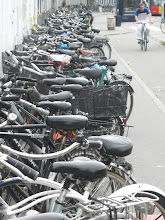I was amazed to read this WWF report the other day and not have heard any commentary on it earlier. Given that it was published in November, it was likely buried under the news of a new hope in the form of President Obama in the US and a badly disrupted global economy keeping the journalists busy.
Dr. Martin Sommerkorn produced the Global Greenhouse Reality 2008 with some stark evidence.
“Scientific evidence accumulating since the IPCC’s Fourth Assessment Report reveals that global warming is accelerating, at times far beyond projections outlined in earlier studies, including the latest IPCC Report. New modelling studies are providing updated and more detailed indications of the impacts of continued warming.”
“Anthropogenic CO2 emissions from fossil fuel are growing four times faster since 2000 than during the previous decade (1990-99: 0.9 per cent/yr; 2000-2007: 3.5 per cent/yr), and above IPCC’s worst case emission scenario(A1FI – intensive dependency on fossil fuels) that predicts 4°C global warming (2.4-6.4°C) for 2100 (Global Carbon Project, 2008).” (page 13 in the link above has a good chart of this)
Yes, our current reality is ABOVE the worst-case scenario outlined by the IPCC.
Worst cases scenarios are not supposed to be reached or worse, surpassed, they’re a theoretical “what if” area. The IPCC is doing the world a disfavour with watered-down forecasts. While academic reputations may be protected from public ridicule by producing conservative climate reports. Governments and the general public need to hear the whole truth if we are going to be able to respond rationally.
Several new studies continue to make the case that we have the opportunity to avoid the worst consequences of global climatic change. But we need to act sooner than later.
We have a window of opportunity to use this faltering global economy and capitalise on the temporary slowdown in greenhouse gas emissions as industry, development, and consumption levels fall. However, the economic downturn is also affecting clean energy markets and money flows to transition to a low carbon economy, measures including government economic intervention will need to be considered.
Economic intervention is only one of several approaches needed and to get a real handle on the problem. We need to start the conversations about limiting population growth, defining what is responsible consumption, and imbedding an accurate price on externalities such as Carbon emissions.
Subscribe to:
Post Comments (Atom)

No comments:
Post a Comment